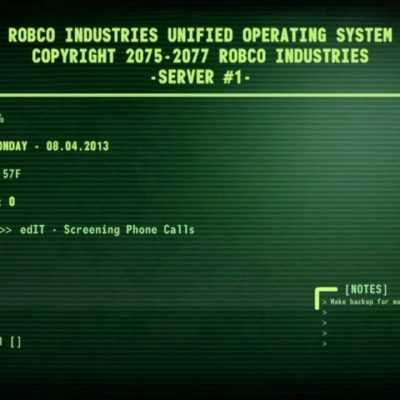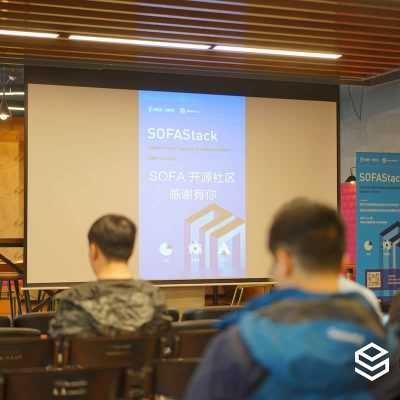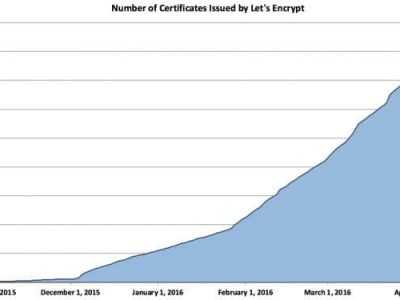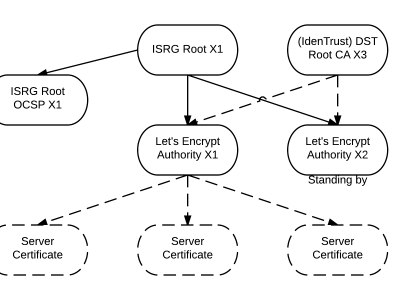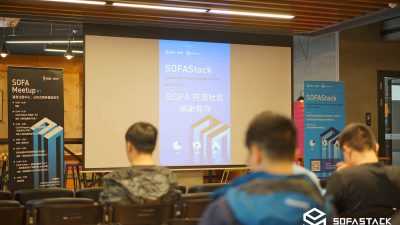在 Ubuntu 15.04 / CentOS 7 上安装广告服务器 Revive Adserver

1. 安装LAMP
首先,Revive Adserver需要完整的LAMP环境才能运行,所以我们先安装LAMP。LAMP是Apache网页服务器,MySQL/MariaDB数据库和PHP模块的集合。要使Revive正常运行,需要安装PHP的众多模块,如apc, zlib, xml, pcre, mysql和mbstring。在不同的Linux发行版中,我们可以用下列命令进行LAMP的配置:
在Ubuntu 15.04下
# apt-get install apache2 mariadb-server php5 php5-gd php5-mysql php5-curl php-apc zlibc zlib1g zlib1g-dev libpcre3 libpcre3-dev libapache2-mod-php5 zip
在CentOS 7下
# yum install httpd mariadb php php-gd php-mysql php-curl php-mbstring php-xml php-apc zlibc zlib1g zlib1g-dev libpcre3 libpcre3-dev zip
2. 启动Apache Web和MariaDB服务
可以用下列命令启动刚刚安装好的Apache Web服务和MariaDB数据库服务。
在Ubuntu 15.04下
Ubuntu15.04使用Systemd作为默认初始系统,所以用下列命令启动Apache和MariaDB进程:
# systemctl start apache2 mysql
可以用下列命令使其开机自动运行:
# systemctl enable apache2 mysql
Synchronizing state for apache2.service with sysvinit using update-rc.d...
Executing /usr/sbin/update-rc.d apache2 defaults
Executing /usr/sbin/update-rc.d apache2 enable
Synchronizing state for mysql.service with sysvinit using update-rc.d...
Executing /usr/sbin/update-rc.d mysql defaults
Executing /usr/sbin/update-rc.d mysql enable
在CentOS 7下
CentOS 7同样是以Systemd作为默认初始系统,可以用下列命令启动:
# systemctl start httpd mariadb
ln -s '/usr/lib/systemd/system/httpd.service' '/etc/systemd/system/multi-user.target.wants/httpd.service'
ln -s '/usr/lib/systemd/system/mariadb.service' '/etc/systemd/system/multi-user.target.wants/mariadb.service'
3. 配置MariaDB
在CentOS 7/Ubuntu 15.04下
当我们第一次启动MariaDB时,MariaDB是没有分配密码的,所以要先设置一个root密码。之后再创建一个新的数据库用来储存Revive Adserver的数据。
使用以下命令配置MariaDB并设置其root密码:
# mysql_secure_installation
这时会要我们输入root密码,但我们之前什么密码都没设置,所以按回车下一步。之后,要求设置root密码,这时我们输入Y,然后输入自己想要的密码。回车继续下一步。
…
so you should just press enter here.
Enter current password for root (enter for none):
OK, successfully used password, moving on…
Setting the root password ensures that nobody can log into the MariaDB
root user without the proper authorisation.
Set root password? [Y/n] y
New password:
Re-enter new password:
Password updated successfully!
Reloading privilege tables..
… Success!
…
installation should now be secure.
Thanks for using MariaDB!
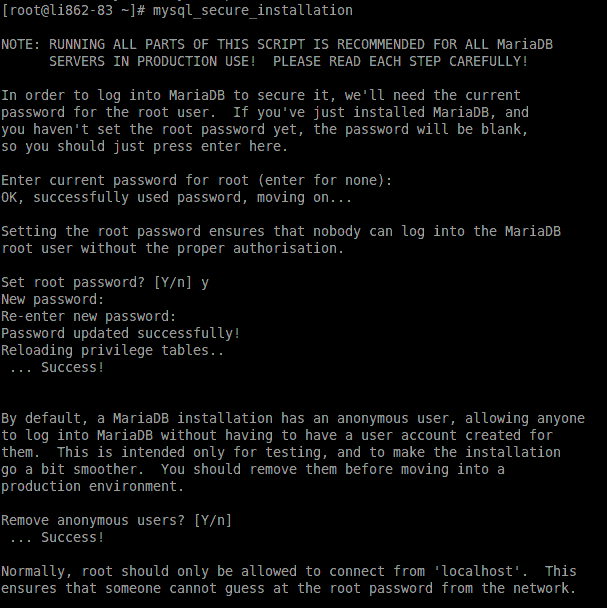
4. 创建新的数据库
为MariaDB的root用户设置了密码之后,就可以创建用来储存Revive Adserver应用数据的数据库。首先通过以下命令登录MariaDB控制台:
# mysql -u root -p
这时要求输入root用户的密码,我们只要输入上一步设置好的密码。然后进入MariaDB控制台创建新的数据库,数据库用户及其密码,并且授予其创建、删除、编辑和存储表与数据的全部权限。
> CREATE DATABASE revivedb;
> CREATE USER 'reviveuser'@'localhost' IDENTIFIED BY 'Pa$$worD123';
> GRANT ALL PRIVILEGES ON revivedb.* TO 'reviveuser'@'localhost';
> FLUSH PRIVILEGES;
> EXIT;
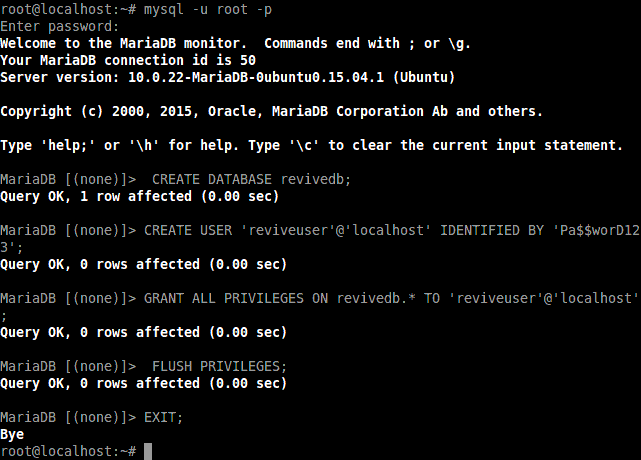
5. 下载Revive Adserver
接下来下载Revive Adserver的最新版本Revive Adserver.3.2.2(写本文时)。可以使用wget命令从Revive Adserverde 官方网站下载压缩包,网址是:http://www.revive-adserver.com/download/ 。命令如下:
# cd /tmp/
# wget http://download.revive-adserver.com/revive-adserver-3.2.2.zip
--2015-11-09 17:03:48-- http://download.revive-adserver.com/revive-adserver-3.2.2.zip
Resolving download.revive-adserver.com (download.revive-adserver.com)... 54.230.119.219, 54.239.132.177, 54.230.116.214, ...
Connecting to download.revive-adserver.com (download.revive-adserver.com)|54.230.119.219|:80... connected.
HTTP request sent, awaiting response... 200 OK
Length: 11663620 (11M) [application/zip]
Saving to: 'revive-adserver-3.2.2.zip'
revive-adserver-3.2 100%[=====================>] 11.12M 1.80MB/s in 13s
2015-11-09 17:04:02 (906 KB/s) - 'revive-adserver-3.2.2.zip' saved [11663620/11663620]
解压到临时目录下:
# unzip revive-adserver-3.2.2.zip
把解压后的整个文件夹移动到Apache Web服务器的默认根目录/var/www/html/下:
# mv revive-adserver-3.2.2 /var/www/html/reviveads
6. 配置Apache Web服务
现在配置Apache服务使Revive正常运行。通过创建配置文件reviveads.conf来创建一个新的虚拟主机。这个目录在不同的Linux发行版上有所不同。
在Ubuntu 15.04下
# touch /etc/apache2/sites-available/reviveads.conf
# ln -s /etc/apache2/sites-available/reviveads.conf /etc/apache2/sites-enabled/reviveads.conf
# nano /etc/apache2/sites-available/reviveads.conf
在这个文件中添加下列几行文本:
<VirtualHost *:80>
ServerAdmin info@reviveads.linoxide.com
DocumentRoot /var/www/html/reviveads/
ServerName reviveads.linoxide.com
ServerAlias www.reviveads.linoxide.com
<Directory /var/www/html/reviveads/>
Options FollowSymLinks
AllowOverride All
</Directory>
ErrorLog /var/log/apache2/reviveads.linoxide.com-error_log
CustomLog /var/log/apache2/reviveads.linoxide.com-access_log common
</VirtualHost>
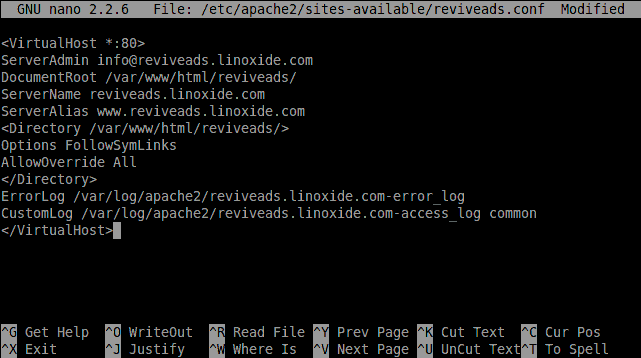
保存并退出,重启Apache Web服务:
# systemctl restart apache2
在CentOS 7下
在CentOS下,我们直接在/etc/httpd/conf.d/ 目录下创建reviveads.conf :
# nano /etc/httpd/conf.d/reviveads.conf
在这个文件中添加下列几行文本:
<VirtualHost *:80>
ServerAdmin info@reviveads.linoxide.com
DocumentRoot /var/www/html/reviveads/
ServerName reviveads.linoxide.com
ServerAlias www.reviveads.linoxide.com
<Directory /var/www/html/reviveads/>
Options FollowSymLinks
AllowOverride All
</Directory>
ErrorLog /var/log/httpd/reviveads.linoxide.com-error_log
CustomLog /var/log/httpd/reviveads.linoxide.com-access_log common
</VirtualHost>
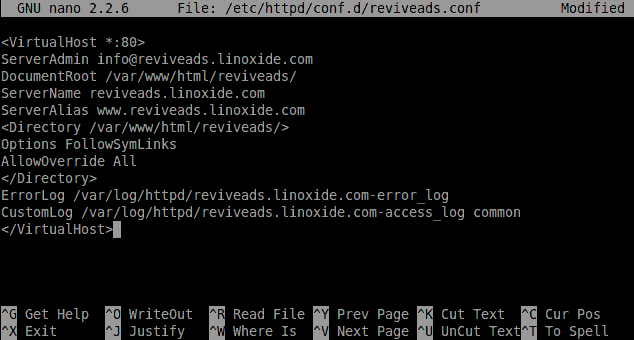
保存并退出,重启Apache Web服务:
# systemctl restart httpd
7. 修复权限和所有权
现在我们修改安装路径下文件的权限和所有权。把安装目录的所有权改成Apache进程所有,以便Apache Web服务有文件和目录的编辑、创建和删除的完全权限。
在Ubuntu 15.04下
# chown www-data: -R /var/www/html/reviveads
在CentOS 7下
# chown apache: -R /var/www/html/reviveads
8. 设置防火墙
现在要配置防火墙,打开80端口使Apache Web服务运行的Revive Adserver能够被网络上的其他机器所访问。
在Ubuntu 15.04/CentOS 7下
Ubuntu15.04/CentOS 7都使用Systemd作为默认初始系统,使用firewalld作为其防火墙。要打开80端口(http服务端口),执行以下命令:
# firewall-cmd --permanent --add-service=http
success
# firewall-cmd --reload
success
9. 网站的安装
顺利的话我们能够使用浏览器进行交互,并可以将浏览器指向正在运行的网络服务器。只要在浏览器输入http://ip-address/ 或者 http://domain.com 。这里我们要访问 http://reviveads.linoxide.com/
打开后可以看到Revive Adserver的欢迎页面,上面还有作为它发行许可证的GNU通用公共许可证V2。点击 I agree 继续下一步安装。
在下一页中,我们要输入数据库信息以便把Revive Adserver和MariaDB数据库服务连接起来。要输入之前设置的数据库名称,用户名以及密码。在本教程中,我们分别输入数据库名称为revivedb,用户名为reviveuser,密码为Pa$$worD123,并且令主机名为localhost,点击continue继续。
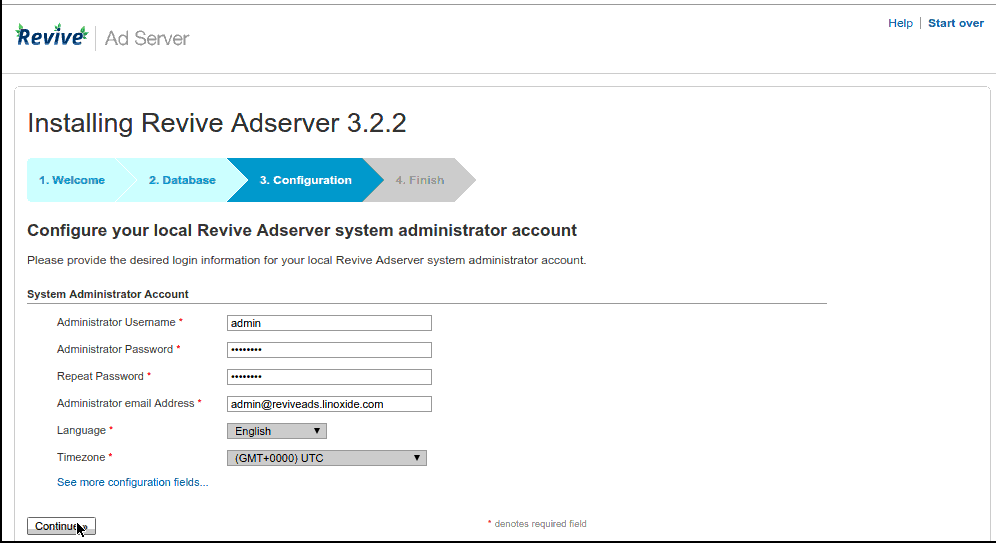
输入要填的信息,如:管理员用户名,密码和邮箱。可以以这些信息登录Adserver的控制界面。然后跳到最后一页,可以看到Revive Adserver已经安装成功了。
接着,转到Adverstiser页面,添加新的广告管理。在控制界面添加新用户到adserver,为广告库户添加标题,网页,视频 广告。
总结
本文中,我们学习了如何在Ubuntu 15.04和CentOS 7上安装并配置Revive Adserver。尽管Revive Adserver的原始代码是从OpenX那买的,但现在OpenX Enterprise和Revive Adserver已经完全分开了。可以从http://www.adserverplugins.com/ 获得更多插件来扩展新特性。讲真,这个软件确实让网页,应用,视频上的广告管理变得容易了许多。
via: http://linoxide.com/linux-how-to/install-revive-adserver-ubuntu-15-04-centos-7/
作者:Arun Pyasi 译者:chisper 校对:wxy
本文转载来自 Linux 中国: https://github.com/Linux-CN/archive



